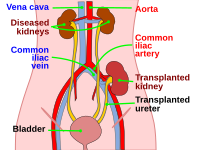
Photo from wikipedia
AIMS Evaluate the weight trajectories after pancreas transplantation (PT) and their relationships with pancreas graft outcomes in type 1 diabetes (T1D). METHODS Retrospective cohort study. T1D individuals who underwent PT… Click to show full abstract
AIMS Evaluate the weight trajectories after pancreas transplantation (PT) and their relationships with pancreas graft outcomes in type 1 diabetes (T1D). METHODS Retrospective cohort study. T1D individuals who underwent PT were recruited (T1D-PT; n=194) and divided into three groups according to transplantation date: 1999-2004 (n=57), 2005-2009 (n=79), 2010-2015 (n=58). For weight comparisons, a random sample of T1D without renal impairment was also recruited during 2015 (n=61; T1D-control). RESULTS The median follow-up for the T1D-PT group was 11.1 years. Despite significant weight loss at 6 months (65.7±12.4 vs. 64.1±11.4 Kg; p<0.001), a stepped increase was seen thereafter (60 months: 68.0±14.0 Kg; p<0.001). Participants from the 2010-2015 period showed higher weight gain (p<0.001), outweighing that observed in the T1D-control (60 months: 4.69±8.49 vs. -0.97±4.59 Kg; p=0.003). Weight gain between 6-36 months was directly associated with fasting glucose and HbA1c at 36 months, and with HbA1c at 60 months (p<0.05). However, in Cox-regression models adjusted for age, sex, and several recipient and PT-related variables, the third tertile of weight gain between 6-36 months showed a non-significant increase in the graft failure/dysfunction (HR 2.33 [0.75-7.27]). CONCLUSIONS Weight gain post-PT was associated with glucose-related biochemical markers of graft dysfunction, which needs confirmation in further studies.
Journal Title: Diabetes research and clinical practice
Year Published: 2021
Link to full text (if available)
Share on Social Media: Sign Up to like & get
recommendations!